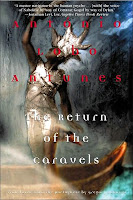 The poet pictured a horde of consumptives in hospital uniforms, crouching in the mist of the dunes, waiting for a laughable monarch who would rise up out of the waters accompanied by his defeated army. Ever since he'd returned from Africa, even the flow of time had seemed absurd to him, and he still hadn't got used to the slow quince-jelly sunsets, the lack of grass with its avid insect rustle, and he would move about the city as if on a planet created by the mechanics of imagination, keeping informed through items in the newspapers that were as enigmatic as the singing of whales.
The poet pictured a horde of consumptives in hospital uniforms, crouching in the mist of the dunes, waiting for a laughable monarch who would rise up out of the waters accompanied by his defeated army. Ever since he'd returned from Africa, even the flow of time had seemed absurd to him, and he still hadn't got used to the slow quince-jelly sunsets, the lack of grass with its avid insect rustle, and he would move about the city as if on a planet created by the mechanics of imagination, keeping informed through items in the newspapers that were as enigmatic as the singing of whales. Antunes has written an extremely complex, perhaps a little too much so, book that encompasses an expanse of Portuguese history. The book is surreal as it juxtaposes historical figure with modern times. Here we find the explorer's sailing caravels docked with modern oil tankers in the 1970s as a former African colony fails into chaos. Combine the melding of different times with long sentences abounding with descriptive metaphors and you have a book that will challenge the reader. Additionally, this is an author who loves to includes disgusting descriptions of biological fluids expelled from every imaginable source. As I began each chapter, I started wondering how many pages it would take to find the word "vomit" again.








 It is time that we should know the person about whom we have been talking indiscreetly, if name and surnames could ever add anything useful to the normal identifying features and other statistics, age, height, weight, morphological type, skin tone, colour of eyes, whether the hair is smooth, curly, or wavy, or has simply disappeared, timbre of voice, clear or harsh, weight, characteristic gestures, manner of walking, since experience of human relationships has shown that, once apprised of these details and sometimes many more, not even this information serves any purpose, nor are we capable of imagining what might be missing.
It is time that we should know the person about whom we have been talking indiscreetly, if name and surnames could ever add anything useful to the normal identifying features and other statistics, age, height, weight, morphological type, skin tone, colour of eyes, whether the hair is smooth, curly, or wavy, or has simply disappeared, timbre of voice, clear or harsh, weight, characteristic gestures, manner of walking, since experience of human relationships has shown that, once apprised of these details and sometimes many more, not even this information serves any purpose, nor are we capable of imagining what might be missing.








 So this is a history book about the Enlightenment and the American Revolution that travels from the carbon cycle of the planet itself, to the chemistry of gunpowder, to the emergence of the coffeehouse in European culture, to the emotional dynamics of two friends compelled by history to betray each other.
So this is a history book about the Enlightenment and the American Revolution that travels from the carbon cycle of the planet itself, to the chemistry of gunpowder, to the emergence of the coffeehouse in European culture, to the emotional dynamics of two friends compelled by history to betray each other.








